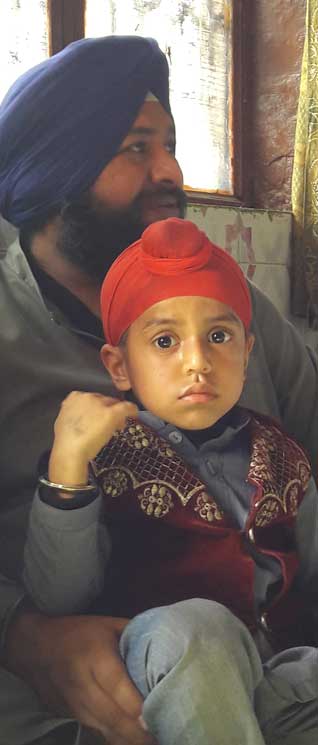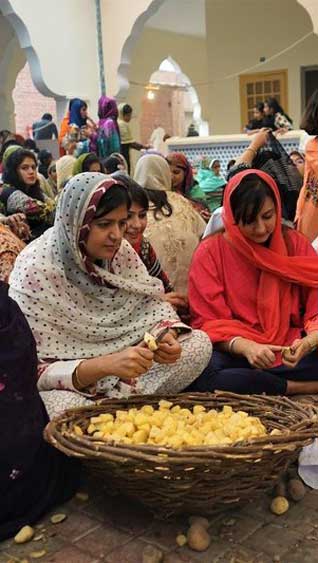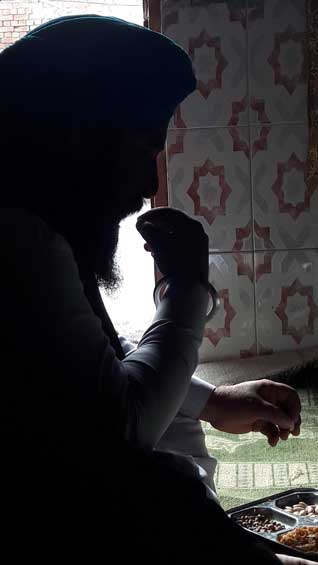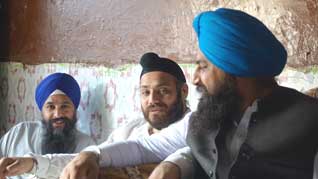Travel
Two Identities, Twice The Pride:
The Pashtun Sikhs of Nankana Sahib
KHAN SHEHRAM EUSUFZYE
On a warm winter afternoon in Nankana Sahib (West Punjab, now in Pakistan), local businessman Amarjeet Singh can’t help an embarrassed smile when recounting what had happened earlier that day at the Gurdwara Janam Asthan, one of the Sikh religion’s holiest sites and the birthplace of Guru Nanak, the religion’s founder.
A preacher had come all the way from England and gave a sermon in chaste Punjabi. The local congregation, specially the women, were having a tough time following the sermon. The reason wasn’t merely that the original language was inaccessible to the congregation’s modern, colloquial Punjabi. A sermon in the latter would have been only slightly better. It was just that they weren’t too used to a sermon in a language other than theirs: Pashto.
One can sense a diminutive yet charming cultural amalgamation in certain localities within the town with the settling of around 250 Pashtun Sikh families in the city. The pulse on the street pounds to the sound of the occasional Pashto music being played in a mobile shop of the bazaar leading to Gurdwara Janam Asthan. Here you find shops with a substantial number of merchants, who though dressed in shalwar kameez, adorn intricately wound and colourful turbans, professing the Sikh religion — maintaining the full discipline of their Sikh Faith. Pashto may still not be the language spoken on the streets but inside the Gurdwara, Pashto seems to be the language of choice.
Every Sikh within the premises of the Gurdwara speaks the language; even the sermons that follow the morning and evening prayers are delivered in Pashto. For them, the language and the cultural aspect associated with it is embedded in their way of thinking, living and being. To live as Pashtuns near their holiest site allows them to live their law, this according to them holds them in balance.
* * * * *
“We were unaware of the horrors of the Partition of Punjab and the subcontinent. Not until the day we arrived in Hassanabdal, three years after the creation of Pakistan. Back in the day, the long and arduous journey was made on foot, mules and bus. The rigour of such travel in those times can well be imagined, with roads being mere cart tracks and even those were non-existent in many places. Modes of transport were slow and primitive and distances to be traveled were enormous, running through mountains and across rivers. It took us four days to reach Gurdwara Punja Sahib and it was there that we realised that our brethren-in-faith have left for a newly created country, India,” an elderly Sardar Rajan Singh vividly recalls.
Not spurred by any kind of identity politics the Sikh community living in the tribal areas and adjoining parts of Afghanistan never left their homes and areas during the division of British India. Unlike the forced mass exodus of Sikh and Hindu families in Punjab, the events that led to the Partition could hardly undo the intricate intertwining of culture and tradition for the Sikh communities living in these areas.
“We never experienced those moment of madness, that phase, that state of mind which turned the interconnectedness of entire lifetimes into feelings of enmity. We were part of a social structure where social equality propped up a social universe of egalitarian individualism, recognizing no overarching authority. The law was simple, if you had a gun, I too had a gun,” said Sardar Rajan Singh while reminiscing the days gone by in a dimly lit baithak (living room) of a rented house right across Gurdwara Janam Asthaan, in Nankana Sahib, with other Pashtun Sikhs – a distinct identity they’ve carved out for themselves.
Every Friday, the Pashtun Sikh community residing in Nankana Sahib takes a day off from work and convenes in baithaks across the city to relax and have discussions. The practice of a Friday holiday, parallel to the Muslim majority’s day of Sabbath, is mostly observed in the Pashtun belt of the country and is also steadfastly observed by the Pashtun Sikh community of Nankana Sahib. Every visitor to the baithak is welcomed with a earthy exchange of Pashto greeting after which he settles down with the rest of the people sitting cross legged on the floor for a cup of green tea. The room is abuzz with chatter on topics related to business, politics and everyday life with the occasional joke making everyone break into a boisterous laughter.
“Does the idea of returning to your ancestral places ever cross your mind?” my question caught everyone’s attention as if I had reawakened a long buried ghost from the past.
“We are in our ancestral place, aren’t we?” Sardar Amarjeet Singh, the second generation of Internally Displaced Pashtun Sikh, answered with a reassuring smile. “Our religious life finds its deepest roots here in Nankana Sahib, the birth place of Baba Guru Nanak. This Gurdwara Janam Asthaan is where our religion started, so to be honest we are home. We have got a new lease on life here and have started over from the beginning under the shadow of our holiest place, we call it relocation.”
“So does this mean that you’ve severed all ties with the people and the region where you lived before?” I inquired.
“No, not at all. People relocate to live a better life but that doesn’t mean that you break away from the culture and tradition that you once lived. The thing is that our migration within Pakistan has always been associated with the victimization of minorities at the hands of the Muslims, which I agree holds some semblance of truth but is not entirely that. We’ve lived alongside our Pashtun brothers since we first settled in the tribal region and other parts of Khyber Pakhtunkhwa in 1872, just like Sardar Rajan Singh said, we became part of their social fabric, we fostered friendships, setup businesses and even were given the right to participate in the decision making process. We lived as neighbors alongside our Pashtun brothers and according to Pashtunwali, a Pashtun is responsible for the well-being of his neighbour, he is his protector and representative. This then begs the question that how can the same people who gave us our identity turn their backs on us?”
Sardar Amarjeet Singh went on to explain that they were not forced to leave their homes because they overstayed their welcome but the situation in the tribal areas aggravated for everyone alike during that time and everyone fled to different parts of the country. Drawing similarities with the Pashtun migration to various part of the country, Amarjeet Singh was of the opinion that like every other person who fled the area and had the means to start afresh, the Pashtun Sikhs also settled down in new places.
“We still have businesses in Peshawar and Khyber agency and visit our places on a regular basis. Our friends still invite us to their weddings and on other occasions and we travel to our villages to be part of those events,” Amarjeet added.
“There was only one way of living in the Pashtun society,” Sardar Rajan Singh commented. “It was called unity, the unity of place and the unity of thought. No one was looked down upon because of his faith or how he appeared. My family was among the first families which migrated to Nankana Sahib and Hasanabdal in 1972. Those were the days when the tribal areas along with the rest of the country were quite a peaceful place. The Pashtun Sikh migration within Pakistan has a pattern. In 1972, we migrated purely for religious reasons, to live close to our religious place and look after them. Similarly in 2002 some Sikh families relocated to Peshawar, Hasanabdal and Nankana Sahib. In 2010, we left our ancestral villages just like everyone did when the government decided to launch a military operation in the region to uproot the menace of militancy. Many Pashtun Sikh families from Malakand and Swat have also migrated to India during the 1980’s and early 90’s.”
“But has the urge to regain ancestral roots ever taken over or have your friends ever asked you to come back?” I asked cautiously so that I don’t draw their collective ire to the question.
“Yes, always,” Rajan Singh answered with a sense of belonging in his tone.
“ A couple of years back I visited Parachinar, the people over there urged us to come back and even showed us their homes that they were willing to give us on our return. They still wish we had never left.”
For the visitors to the Gurdwara from the Sikh diaspora, a Sikh speaking Pashto is a sight of bewilderment. For years people of the Punjab have thought of the Sikh culture, in essence, as the epitome of the Punjabi culture preserving and maintaining spirit of “Panjabiyat” both in its intellectual and physical aspects through historical traditions and linguistic dimensions. Amarjeet Singh thinks that many might argue that their ties with Pashto language will grow increasingly attenuated over time but what they don’t understand is the fact that the Pashtun Sikhs can’t afford to lose their identity.
“The argument is how we see ourselves and how others want to see us.”
* * * * *
Like any other migrant community, the Pashtun Sikhs have also brought with them their own cultural patterns, value orientations, goals, and patterns of behavior. All of them are quite keen in preserving their unique identity and no occasion, whether it is a wedding or a funeral is complete without the traditional customs being followed. Particularly for a wedding, they prefer to call musicians and performers from Peshawar and the tribal areas.
“We can’t celebrate to the Punjabi dhol and songs, we never did. The Pashto music resounds with our cultural and traditional values and we make special arrangements for the visiting musicians to our weddings,” said Sardar Gurpreet Singh from Orakzai agency.
Though as Sikhs all of them share a common history but it is during their weddings that one can identify their association with the tribal agency they belong to. For instance Sikhs from the Orakzai Agency will prefer musicians and performers from the Orakzai agency to perform on their weddings, similarly the ones hailing from Khyber agency will celebrate to the tunes of Afridi dhol and songs.
The songs resonate with them and take them back to a time when they roamed the rugged mountains of the tribal areas, it’s their way of keeping those memories fresh. They believe that music is the child of prayer and it holds the power to both elevate a mortal to higher spiritual goals and keeps them grounded to their roots.
This heightened aspect of identity has also made its way into the cultural fabric of the city with the locals having started to pick Pashto language words, sound and intonation patterns. From playgrounds to the market places, a Pashtun Sikh is often welcomed with a few words from the Pashto Language.
“We are Pashtuns, our forefathers and our next generations all will remain wedded to Pashtunwali. Even our relatives who’ve migrated to Delhi take pride in being called Pashtun Sikhs, and many others who’ve kept Pashto alive in faraway lands. It’s a matter of pride for them when they tell others where they’ve come from. The Pashtun aura has a mystical charm to it,” said a beaming Sardar Rajan Singh.
Like other Pashtuns displaced from their homes and ancestral places, the Pashtun Sikhs have been successful in keeping the basic foundation and ethos of their cultural and tradition intact. Detached from their source of origins they cherish and live every moment that connects them to their region.
For these Sikhs the love for their land cannot diminish because of their current geographical location. Their stories are connected to their past, and their past is what gives them their identity. Through their songs and prose, they’ve connected their story to their ancestral places, with every object in the landscape and their faith.
Whereas the lands where their presence once gave the region an air of a tolerant, pluralist society, long for the sons of soil to return.
[Courtesy: Pakistan Today. Edited for sikhchic.com]
March 12, 2018






